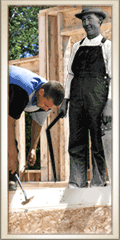|
|||
|
Now Over 25,000 Categorized Links! Family Census Data Directory |
|
|||
|
Now Over 25,000 Categorized Links! Family Census Data Directory |
|
|

|
1830 CensusGo to available databases for 1830The 1830 census was begun on 1 June 1830. The enumeration was to be completed within six months but was extended to allow completion within twelve months. Questions Asked in the 1830 Census Name of head of household; number of free white males and females in age categories 0 to 5, 5 to 10, 10 to 15, 15 to 20, 20 to 30, 30 to 40, 40 to 50, 50 to 60, 60 to 70, 70 to 80, 80 to 90, 90 to 100, over 100; number of slaves and free “colored” persons in age categories; categories for deaf, dumb, and blind persons and aliens; town or district; and county of residence. Other Significant Facts about the 1830 Census The 1830 census was the first for which the government provided uniform, printed forms to enumerators for the purpose of recording answers to census questions. Research Tips For the 1830 Census The 1830 census records are useful in identifying the locality to be searched for other types of records for a named individual. The 1830 census will, in most cases, help distinguish the target family from others of the same name; help to determine family size; locate possible relatives with the same name; identify immediate neighbors who may be related; identify slaveholders; and spot spelling variations of surnames. Free men “of color” are listed as heads of household by name. Slaves appear in age groupings by name of owner. By combining those age groupings with probate inventories and tax list data, it is sometimes possible to determine names of other family members and the birth order of those individuals. The 1830 census went a step further in breaking down ages, thus allowing more precise knowledge of the household configuration. With the age categories expanded to include those one hundred years and older, it is possible to have a better idea of life spans during that time period. The addition of information regarding those who were deaf, dumb, and blind is an indication that there may be related guardianship or institutional records. The presence of aliens in a household suggests the possibility that those individuals may eventually have been naturalized in a nearby court. Go to available databases for 1830
|
|